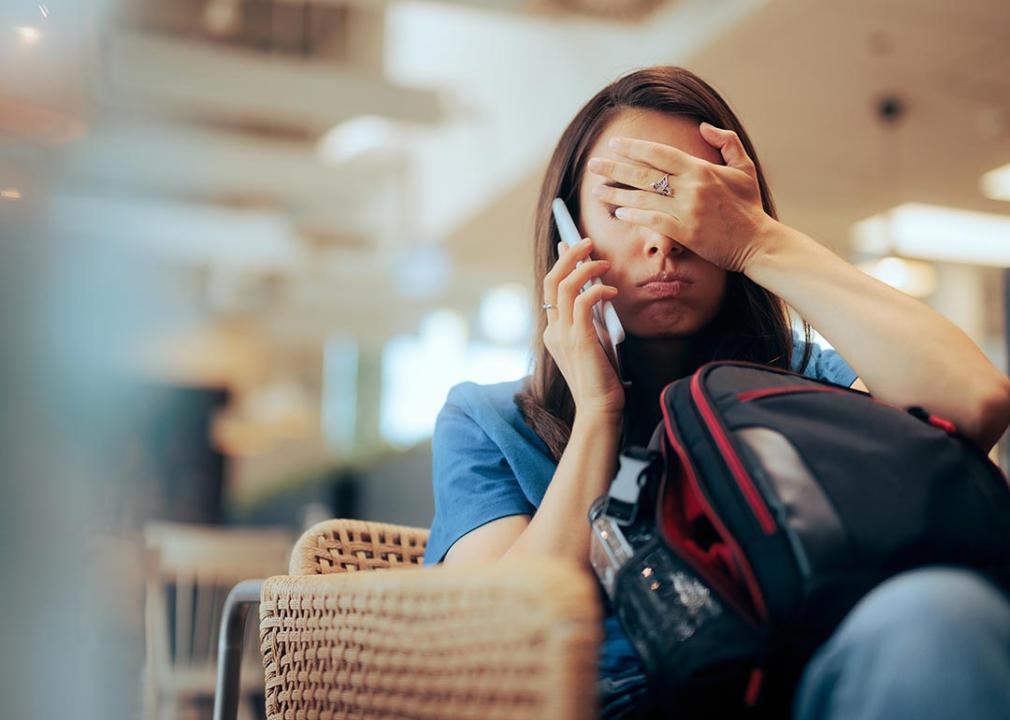Data shows that vacations can cause stress

Nicoleta Ionescu // Shutterstock
Data shows that vacations can cause stress
Person on the phone at airport gate, showing signs of frustration covering face with hand while sitting with luggage.
Vacations are, in theory, a break from the daily grind — a chance to unwind, explore new places and recharge mentally and physically. In practice, though, vacations can also bring about stressors and even take an unexpected toll on mental health.
Research shows that planning a trip, traveling to your destination, and being on vacation elicit stress for many travelers. According to a 2012 national study, the most stressful part of vacation for many people is planning, especially for those traveling internationally with a spouse or relative. For first-time travelers and younger adults, though, the study found higher rates of stress during the vacation itself. While vacations are meant to be relaxing, this research highlights how they are sometimes sources of anxiety rather than an escape from it.
However, taking time off has some well-documented mental health benefits, with most working Americans reporting that vacations positively affect well-being. In its 2018 survey of over 1,500 working adults, the American Psychological Association (APA) found that most people (57 percent) return to work from vacation feeling more motivated and less stressed. Also, about two out of three return from vacation feeling more positive (68 percent) and with more energy (66 percent). An earlier survey of a similar size found that vacation was associated with better well-being and lower levels of depression (as measured by the Pittsburgh Enjoyable Activities Test). Notably, the results of this survey remained significant even after adjusting for demographics.
To assess how vacations affect mental health — for better and for worse — Charlie Health looked at the numbers, including data on common vacation stressors and research on the benefits of taking time off.
Many different stressors can arise on vacation
As mentioned, vacation can both relieve and cause stress. Through interviews and observations, one study of about 50 tourists found that people experience four main types of stress on vacation: stress related to service providers, travelers themselves, travel partners, and the environment.
More than half of people might feel anxious about air travel
One common stressor is air travel, data shows. Out of 238 respondents in one study, about 40 percent experienced anxiety during takeoff and landing, over 50 percent felt anxious about flight delays, and 33 percent worried about customs and baggage claims. Overall, women experienced higher air travel anxiety than men, the study found.
The mental health benefits of vacation can fade within a few days
Although the APA survey mentioned above found that most working adults return from vacation feeling more motivated, less stressed, and with a boost in positivity and energy, these effects are short-lived, according to researchers. The survey found that the positive mental health effects of a vacation fade quickly, in as little as a “few days” for 40 percent of respondents. Similarly, an earlier survey of 131 teachers found that while vacations led to increased work engagement and reduced burnout, these benefits diminished within a month.
Vacation can be linked with a lower risk of death over time
In addition to the mental health benefits of vacation, taking time off can be good for physical health (which in turn can benefit mental health). A study of over 12,000 middle-aged men at high risk for coronary heart disease found that more frequent vacations were linked to a lower overall risk of death and a reduced risk of death from cardiovascular causes. These findings held true even after adjusting for variables like income and nonfatal cardiovascular events during the nine-year study period.
Taking multiple annual vacations is linked with heart health for some
Similarly, researchers tracking 749 women from Massachusetts over two decades discovered that those who took multiple annual vacations were less likely to develop heart problems. On the flip side, the study found that those who took vacations less than once every six years were nearly eight times more likely to develop heart problems than their twice-annual-vacationing counterparts.
How to maximize your vacation to boost mental health
Below are some steps that can be taken to set yourself up for relaxation on vacation and maximize the mental health benefits of time off. Whether you’re planning a quick weekend getaway or a long, adventurous trip, these tips will help you return home feeling as well as possible.
Plan mindfully
Since data shows that vacation planning can be a significant source of stress, especially for international trips or those involving family, approaching it mindfully can reduce anxiety. Break down the process into manageable steps, delegate tasks when possible and set realistic expectations to avoid overwhelm.
Prepare for common stressors
If there’s a part of travel that often causes stress, plan ahead. For example, knowing that air travel is a source of anxiety for many, allow extra time for delays and stay organized with your travel documents and baggage. You can also consider practicing relaxation techniques or using apps designed to help with travel anxiety throughout a vacation.
Find other ways to take care of yourself
While vacations can recharge you, their mental health benefits may be short-lived, fading within a few days for many people. To extend these benefits, try to incorporate elements of relaxation and mindfulness into your everyday life when you return and seek help for mental health conditions.
![]()
This story was produced by Charlie Health and reviewed and distributed by Stacker Media.